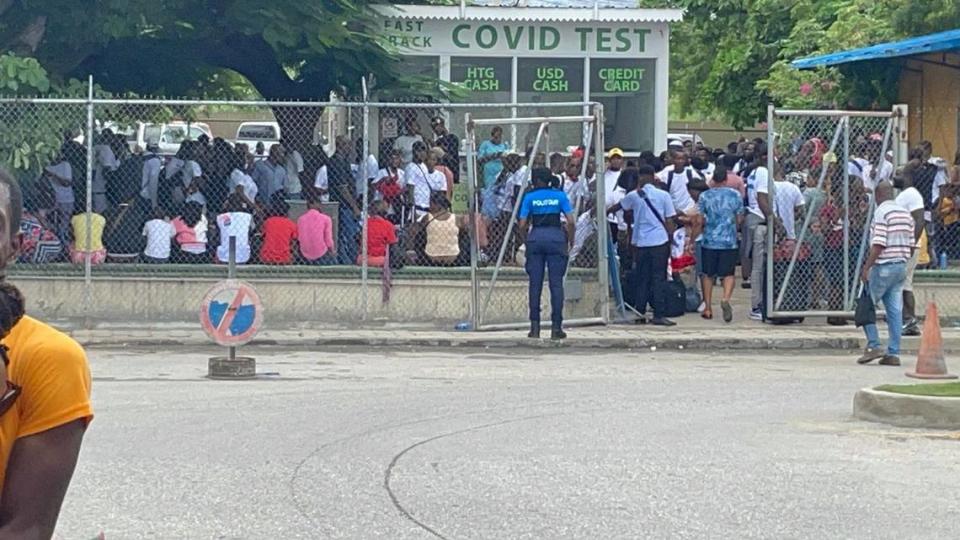Biden administration issues warning to those involved in Nicaragua-bound migrant flights
The Biden administration on Monday warned those involved in a new migration scheme to help Cubans, Haitians and other asylum seekers reach the United States by flying expensive charter planes to Central America that they risk the wrath of U.S. law.
Brian Nichols, assistant secretary of state for the Western Hemisphere, said he is concerned by reports of a dramatic increase in Nicaragua-bound charter flights carrying Haitians, Cubans and others migrants who, with the help of traffickers, make their way to Mexico with the hope of entering the U.S.
By flying directly into the Augusto C. Sandino International Airport in Managua, migrants have been able to bypass the Darién Gap, the dangerous stretch of jungle separating Colombia and Panama, and get around U.S. asylum restrictions.

Last week, the Miami Herald and independent Nicaraguan media outlet and partner La Prensa reported that tens of thousands of Haitians had made the trip since August, paying as much as $4,000 for a one-way ticket from Port-au-Prince to Managua. Hours after the Herald’s report, the government of Haiti announced the suspension of all Nicaragua-bound flights. But the head of Haiti’s National Office of Civil Aviation, Laurent Joseph Dumas, has told local media that the shutdown is only temporary to allow for better organization, and the flights will soon resume.
“No one should profit from the desperation of vulnerable migrants — not smugglers, private companies, public officials or governments,” Nichols said on X, the site formerly known as Twitter.
The administration, he said, “is exploring the full range of possible consequences for those facilitating this means of irregular migration. We continue to urge the use of safe and lawful pathways.”
Eric Stromayer, the chargé d’affaires at the U.S. Embassy in Port-au-Prince, warned Haitiansin a video message that if they are “considering going to Nicaragua and then traveling overland to enter the United States illegally,” they should think twice.
“We will deport all those arrested who were seeking to enter the United States illegally by land and will no longer have the right to enter the United States by legal means,” he said.
Before Haiti’s suspension of the flights, the Augusto C. Sandino International Airport in Managua received an average of 15 flights a day from the international airports in Port-au-Prince and Cap-Haïtien. There are also daily charter flights from the Dominican Republic, Providenciales in the Turks and Caicos and elsewhere around the region.
Manuel Orozco, who directs remittance, migration and development research at the Inter-American Dialogue, a think tank in Washington D.C., said most of those making the journey are being paroled into the U.S. by using the new Customs and Border Protection One smartphone application. Orozco said that as many as 31,000 Haitians on at least 268 flights have flown to Nicaragua since August.
The charter flights have long been popular with Cubans who have been flying on Venezuela-state owned airlines to get to Central America. It has since grown in popularity among Haitians and Africans after the regime of Daniel Ortega suspended visa requirements, meaning people from those nations simply need the money to buy the airfare. Experts say Ortega is weaponizing migration amid an effort from the United States, Mexico, and other regional governments to reduce the historic levels of migrant flows in the hemisphere.
The United Nations’ International Organization for Migration warned last month of an unprecedented surge of migration in Latin America, fueled by record numbers of people who are crossing the Darién Gap. But increasingly, more migrants are instead flying directly to Nicaragua as well as El Salvador to begin making their way by land to the U.S.-Mexico border.
The group reported that Honduras had seen an increase of 553% of arrivals of African migrants between January and July of this year coming in through its southern border, which the country shares with Nicaragua. It also saw 17,157 Cubans reaching the Honduras-Nicaragua border compared to 524 crossing the Darién Gap during that same time period.
Last month, El Salvador enacted a $1,000 fee for migrants from more than 50 African countries and India, saying that more people were arriving through the airport and that the money would go towards airport improvements.
On Monday, the White House announced that following the Americas Partnership for Economic Prosperity Leaders’ Summit last week, in which migration was discussed, President Biden announced nearly $485 million in additional humanitarian assistance to respond to the needs of refugees, migrants, and other vulnerable populations across the Western Hemisphere, including those displaced across Latin America and the Caribbean and by the political and economic crisis in Venezuela.

